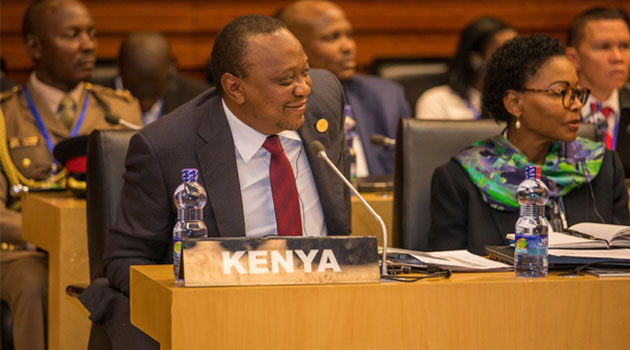ADDIS ABABA, Ethiopia, Jan 29 – President Uhuru Kenyatta on Monday expressed satisfaction that a continental instrument for monitoring performance made great strides in fostering improved governance as a vehicle for accelerated development in the last two years.
President Kenyatta said the African Peer Review Mechanism (APRM), which he has chaired for the past two years, is now more rejuvenated than it was before.
The mechanism’s primary objective is to promote the adoption of policies, values, standards and practices of political and economic governance that lead to political stability, accelerated sub-regional and continental economic integration, economic growth and sustainable development.
“We have made great strides since I took the stewardship of the APRM in June 2015. These include the revitalisation of the mechanism. The membership reached 37 members of the African union, after Gambia acceded at the 27th APR Forum Summit at the weekend,” President Kenyatta said.
President Kenyatta spoke when he presented a report on Africa’s peer review efforts covering the last two years as the 30th Ordinary Session of the AU Assembly came to a close at the AU headquarters in the Ethiopian capital Addis Ababa.
Outlining the achievements of his tenure of two years, the President said six countries – Djibouti, Senegal, Chad, Sudan, Kenya and Uganda – were reviewed.
To achieve this, President Kenyatta said a committee to resuscitate and rejuvenate the mechanism was set up in 2016.
“The mechanism developed its first strategic plan, and strengthened the financial, material and human capacity of the secretariat. This revitalization programme has yielded a lot to ensure that the APRM moves forward,” President Kenyatta said.
He said a dynamic new Chief Executive Officer of the APRM Secretariat, Professor Eddy Maloka, was appointed at the January 2016 Summit and under his watch the APRM undertook a series of systematic, all-encompassing and sustained efforts that advanced the revitalization agenda.
The mechanism further developed tools and methodologies in accordance with the goals and aspirations of the AU Agenda 2063 and UN Sustainable Developmental Goals 2030.
President Kenyatta said the mechanism also broadened and strengthened its partnerships, bringing on board an additional two strategic partners – the MO Ibrahim Foundation and the Africa Capacity Building Foundation – in addition to the UNDP, UN Economic Commission for Africa and African Development Bank.
“These partners brought added technical capacity and credibility to the APRM,” the President pointed out, adding that the APRM – in coordination with stakeholders – developed its statute that has given a legal persona and institutional integrity befitting a continental governance assessment body.
The presentation of the APRM report came two days after President Kenyatta chaired the 27th Summit of the forum in Addis Ababa, a meeting that was attended by 10 Heads of State and Government participating in the APRM.
Following a report by President Paul Kagame on reform of AU Organs which stated that the APRM should be strengthened to track implementation and oversee monitoring and evaluation of governance on the continent, President Kenyatta said during his tenure as chair, the mechanism embarked on the operationalization of that mandate.
As the APRM marks 15 years of its existence and declares this the year of Universal Accession to the APRM family, President Kenyatta encouraged the 18 AU member states that are yet to accede to do so.
“As I end my tenure of office and hand over to my brother, President Idriss Deby Itno (of Chad), I am confident that the APRM will bank on the gains we have made in the past two years, to achieve even greater results under the incoming leadership,” President Kenyatta said.
The APRM was established in 2003 by the New Partnership for Africa (NEPAD) Heads of State and Government Implementation Committee. It is a self-monitoring instrument and its membership is voluntary.










































